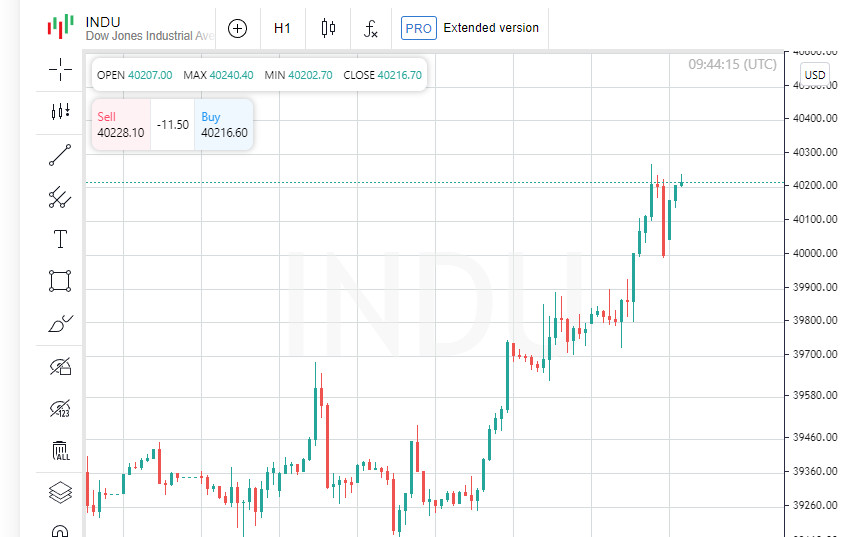
The dollar was flat on Monday, while long-term U.S. Treasury yields rose as investors weighed whether an assassination attempt on presidential candidate Donald Trump could boost his chances of winning.
European stock markets opened lower after weak economic data from China left a cautious mood. Additionally, negative news from British luxury brand Burberry and watchmaker Swatch Group raised questions about consumer confidence.
Investors typically react to the prospect of a Trump victory by pushing up Treasury yields, assuming his economic policies will lead to higher inflation and government debt.
On online betting platform PredictIT, the odds of a Republican victory rose to 67 cents, up from 60 cents on Friday. The yield on the benchmark 10-year Treasury note rose 2 basis points to 4.208% on Monday.
Eren Osman, managing director of asset management at Arbuthnot Latham, said a possible Trump victory would be viewed positively for risk assets. He pointed to the significant gains in Bitcoin since the weekend, but added a note of caution.
"You could imagine that this would motivate Trump supporters to go to the polls, but they were probably planning to vote anyway," Osman said.
U.S. retail sales data due on Tuesday will be closely watched to understand the health of the consumer sector after recent readings suggested economic growth was slowing, the expert said.
The dollar index rose modestly to 104.9, helped by the greenback's strength against the yen, which rose 0.17% to 157.855 after last week's intervention was expected.
The euro was down slightly at $1.0907, while Bitcoin, which has likely benefited from looser regulation under the Trump administration, rose about 5% to a two-week high.
European stocks were down 0.2% (STOXX), while S&P 500 and Nasdaq futures were up about half a percent. Japan's Nikkei was closed for a holiday.
The weak economic data set off a busy week in China, where the five-yearly meeting of top officials is taking place from July 15 to 18.
China's second-quarter economic growth was 4.7% from a year earlier, short of analysts' forecast of 5.1%. Consumer spending is a particular concern, with retail sales growth falling to an 18-month low and new home prices falling at their fastest pace in nine years.
"Markets are hoping for more support for the weak economy and struggling property sector to be announced at this week's plenary," said Vasu Menon, managing director of investment strategy at OCBC in Singapore.
China's onshore yuan remained under pressure, trading at 7.2742 per dollar. Mainland Chinese shares (.SSEC) were little changed, while Hong Kong's Hang Seng Index (.HSI) was down 1.5%.
The week will see data on retail sales, industrial production, housing starts and weekly jobless claims released in the United States.
Federal Reserve Chairman Jerome Powell is scheduled to speak at the Economic Club of Washington on Monday, where his response to the recent muted inflation data is likely to be discussed.
Markets are pricing in a 96% chance of a Fed rate cut in September, up from 72% a week earlier.
The European Central Bank is expected to leave its current interest rate unchanged after cutting it in June.
"We expect the ECB to keep rates on hold at its July meeting, with a press conference to discuss the rate trajectory and the situation in France," Morgan Stanley said in a note.
The second-quarter earnings season kicked off last week and continues on Monday with Goldman Sachs' earnings results.
Bank of America, Morgan Stanley, ASML and Netflix Inc. are also set to report earnings this week. Wall Street is expecting strong results for the period, with most of those expectations already factored into current stock valuations.
In commodities markets, gold traded at $2,408 an ounce, slightly below last week's high of $2,424.
Oil prices edged higher after Friday's slide on signs of progress in ceasefire talks between Israel and Hamas.
Brent crude was little changed at $85.04 a barrel, while U.S. crude rose 0.1% to $82.27 a barrel.
Fed Chair Powell to Speak
Federal Reserve Chair Jerome Powell will be interviewed by David Rubenstein at the Economic Club of Washington, followed by a question-and-answer session.
In his final appearance on Capitol Hill, Powell emphasized the Fed's efforts to combat inflation and reaffirmed its commitment to its dual mandate of price stability and maximum employment.
He also expressed cautious optimism about inflation trends, indicating some confidence that inflation will decline toward the 2% target. However, Powell stressed that it is too early to say whether the trend toward the 2% inflation target will be sustainable.
 English
English 
 Русский
Русский Bahasa Indonesia
Bahasa Indonesia Bahasa Malay
Bahasa Malay ไทย
ไทย Español
Español Deutsch
Deutsch Български
Български Français
Français Tiếng Việt
Tiếng Việt 中文
中文 বাংলা
বাংলা हिन्दी
हिन्दी Čeština
Čeština Українська
Українська Română
Română

